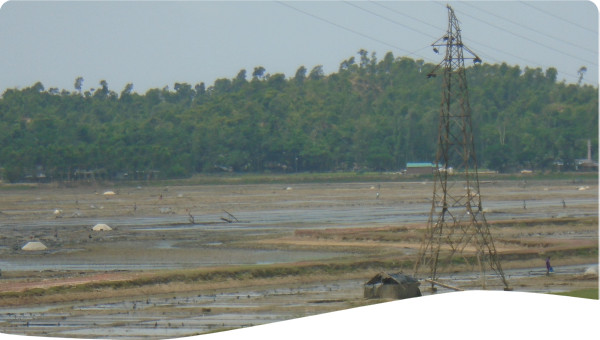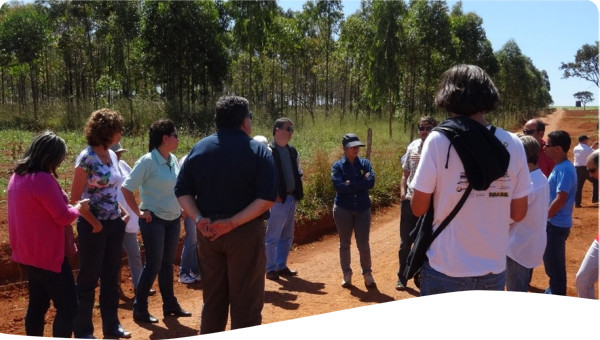La Poza micro-basin is experiencing severe environmental degradation, mainly due to unsustainable deforestation practices executed to expand agricultural land. To combat the issues, action was taken to implement IWRM. Throughout the implementation, there has been a high level of community participation facilitated by extensive capacity building and training in environmental management. The primary lesson drawn from this example is the crucial importance of community participation for a successful implementation.
La Poza microbasin is situated in the southwestern part of El Salvador bordering the Pacific Ocean. The basin has an area of 10.4 km2 and its altitude ranges between 1424 m and 89 m above sea level. The issues in the basin included deforestation caused by, among others, slash and burn practices and increased pressure on land for agriculture.
Deforestation has caused changes in flow variations and occasional drying out of rivers and streams, seriously affecting water supply for domestic use, livestock and agriculture.
Changes in vegetation cover have caused increased soil erosion with negative effects on reservoirs and soil productivity.
Rising level of pollution have occurred as a result of agrochemicals, sewage and solid waste entering surface waters.
In the La Poza microbasin indifference has typically prevailed towards natural resources preservation. Prior to the intervention described below, neither the Ministry of Public Health, the Municipality, national law enforcement officers nor academia had the required awareness on use, development, conservation and protection of the water resources.
There was lack of political will and the population in general was unaware of water resources issues. The absence of a legal framework for implementation of integrated water resources management (IWRM) was an additional constraint as was the lack of financial and human resources.
In 1999, the USAID funded AGUA project began activities in the region. The project aimed to develop an IWRM framework which could also serve as a model for other river basins in El Salvador.
Actions in La Poza microbasin began with a training process addressing the community and the representative institutions in the basin.
The existing community organization promoted social issues but with a focus on IWRM. A Management Committee for La Poza microbasin was created as part of the actions to address the critical situation of water resources. In order to encourage its creation, training on organization matters was delivered. The committee was composed of community leaders and began activities in 2002.
An awareness process was developed for the implementation of payment for environmental services as a financial mechanism that would contribute to water resources management. This process started with the identification of four water administration boards, which each received environmental services from the microbasin.
These boards, in exchange for the benefits from the microbasin resources, make payments for environmental services, which are invested in the building of slope creeks, infiltration wells and hedgerows. Implementing these actions was a midterm process that required lobbying and involvement of several local social partners.
Other actions that have contributed to the organizational strengthening are the continuous training process in subjects such as leadership, environment, microbasin management (characteristics, basin information and the water cycle). A Management Plan for the microbasin La Poza was developed in 2004.
The plan was formulated with the participation of community leaders in workshops where problems, needs and demands of the communities located in the micro basin were identified.
The resulting plan included the following components: a) soil and water; b) legal component; c) basic rural sanitation; d) strengthening of the board of directors; and e) fund raising.
Simultaneously, extended meetings took place in order to validate the documents and create a microbasin organization, with partners from both involved municipalities (Ozatlan and Usulutan). This microbasin organization, created from the Managing Committee, takes part in the implementation and follow-up of the plan.
After this, a legalization process started, and allowed the creation of a legal organization called “Association for the Development and Protection of La Poza Microbasin” (ASDEPROMIPO).
The work of ASDEPPROMIPO has facilitated soil conservation initiatives previously identified by Water Boards. Initiatives that have been implemented up to this point in time have generated benefits at several levels: Conservation of forests and vegetation in the upper microbasin has improved to water availability in dry periods. Conservation efforts have also improved water infiltration, which has mitigated the damage that storms caused in the area.
The participation of the Water Committees in the management of the funds collected through environmental services payment has brought about a successful implementation of this financing mechanism. The Water Boards, after realizing that they themselves would handle and invest those funds, wholeheartedly collaborated on the implementation.
There is a high level of community participation in the training process, planning, implementation of payment for environmental services, investments in conservation efforts, decision making, etc. Nevertheless, some water users, mainly cooperatives and individual producers, have not been able to join the process, primarily due to the lack of attention given to this sector.
The factors that contributed to the success of the Association for La Poza microbasin are, amongst others, the people’s willingness to do voluntary work, the high degree of stakeholder participation
FUNDAMUNI has also implemented new financial instruments, such as payment for environmental services, which allows sustained funding. The charge for environmental services requires a legal framework that backs up such a financing mechanism.
 Case studies
Case studies

